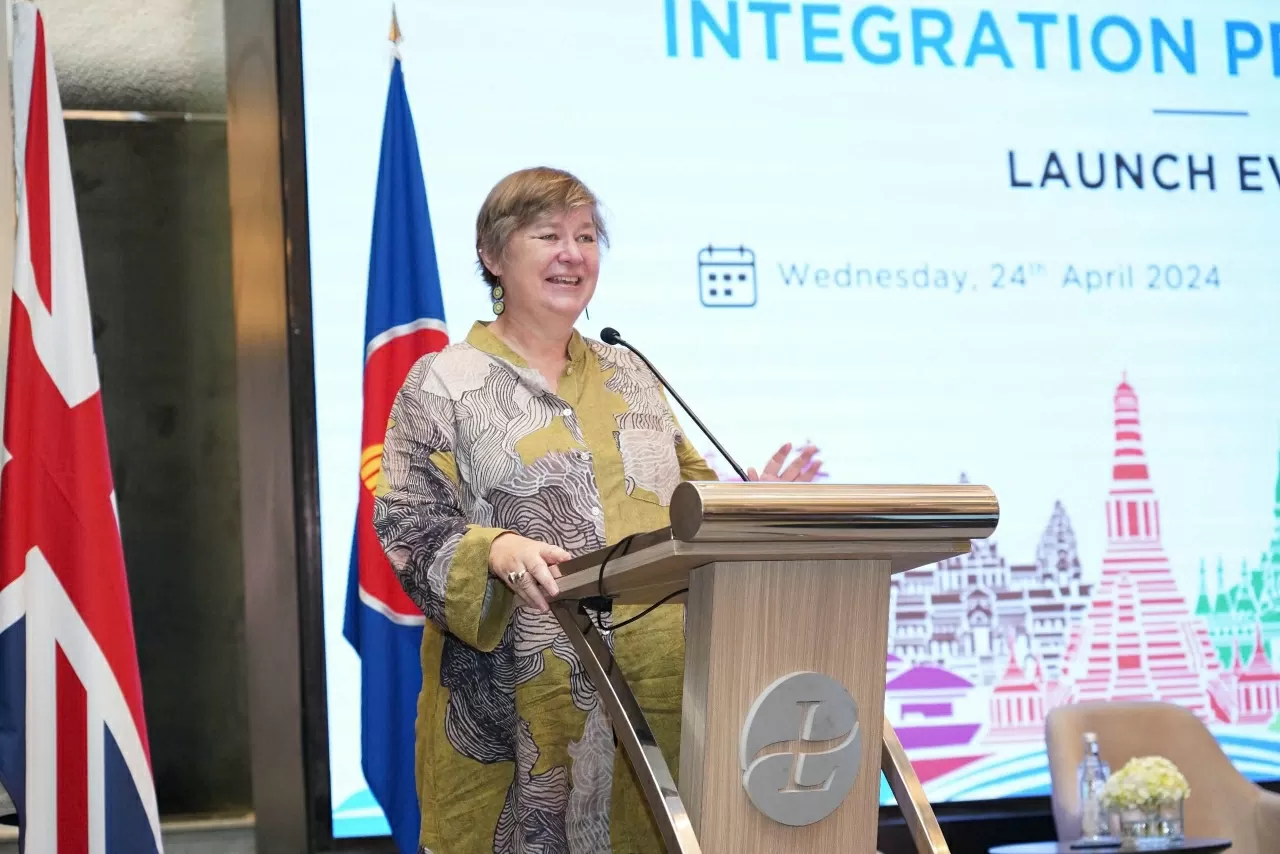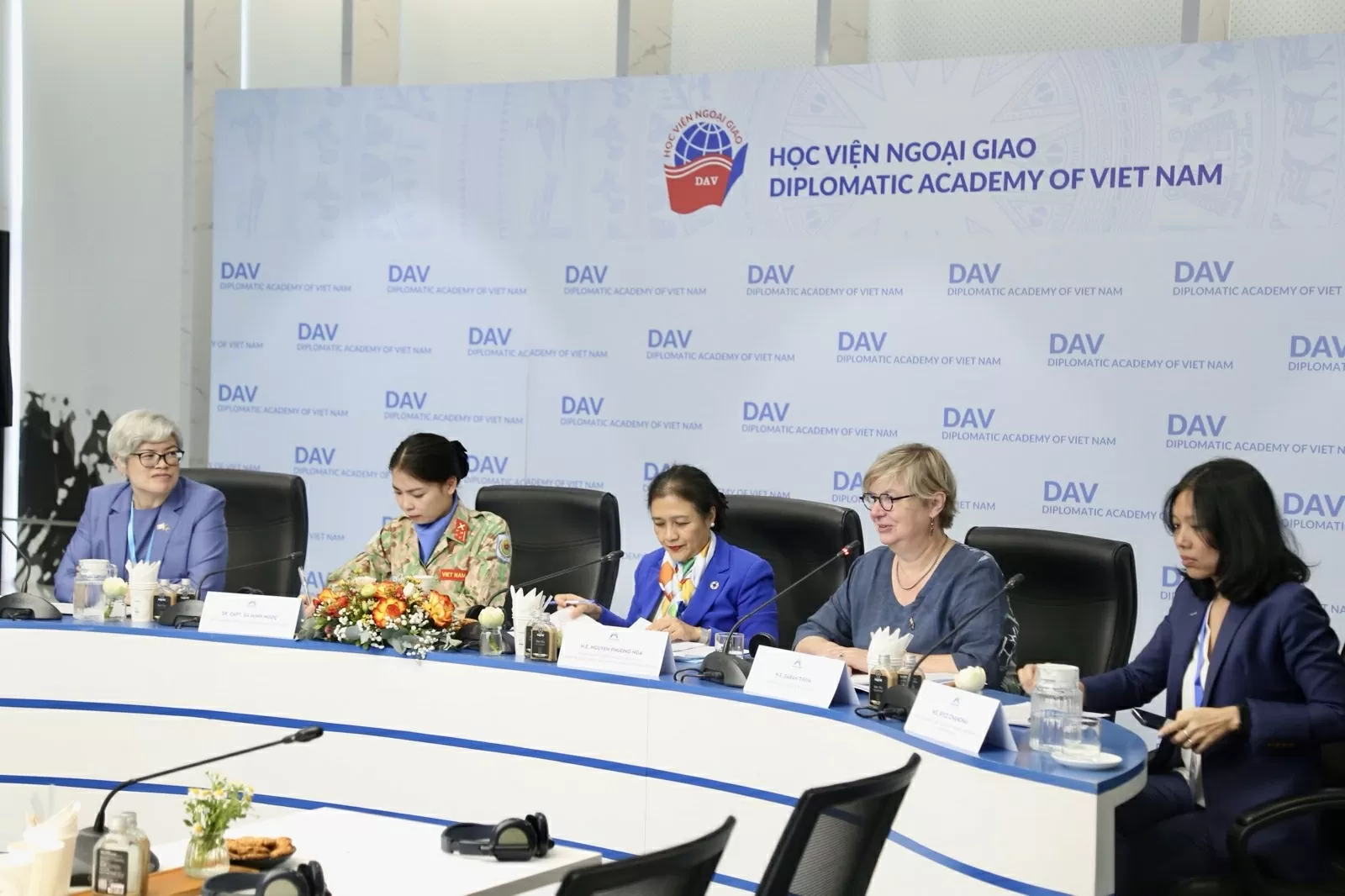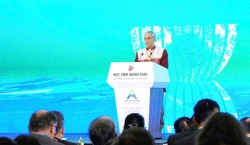
Youth as a new focus in the UK’s peace and security agenda at ASEAN: UK Ambassador to ASEAN
Latest
 |
| UK Ambassador to ASEAN Sarah Tiffin. (Source: British Embassy Hanoi) |
UK Ambassador to ASEAN Sarah Tiffin spoke with The World and Vietnam Report on the occasion of the ASEAN Future Forum 2025 on UK role as ASEAN's Dialogue Partner.
Could you share more about how the UK is shaping its role in ASEAN’s sustainable development and the key milestones since becoming a Dialogue Partner? Given the ongoing geopolitical and economic shifts, what strategies does the UK have to elevate its cooperation with ASEAN in key areas such as economy, education, green transition, and security?
The UK became a Dialogue Partner to ASEAN just four years ago, and we reached the first new dialogue partner for 25 years. As it's been a long time since ASEAN accepted a new Dialogue Partner, we were absolutely delighted.
We’re committed to working and partnering the across all of ASEAN’s priorities, but particularly those where there's a real overlap between what ASEAN is trying to do and where the UK might have expertise, or the other way round, where the UK has a particular interest in learning from what's going on in ASEAN and from ASEAN’s expertise.
We have partnered with ASEAN to design and devise a number of programs, which we're rolling out in support of not just ASEAN’s priorities, but also the commitments that we've made in the plan of action that we've reached with ASEAN.
We're four years into that five-year plan of action, and we’re on track to meet over 80 per cent of the commitment in it. Lots of that through these six programs in particular: There's one on economic integration, as there's a real sense amongst the ASEAN leadership of the responses to the changing global environment has to be the region’s own economic integration and trade within the region, but with a particular focus on financial services. As we're known as a country that has a very strong financial services sector in the industry, so we're working with ASEAN on financial services.
We also have a programme supporting the advancement of girls in education at all stages. Under that programme, we've offered women in STEM scholarships to candidates from across ASEAN to study at two absolutely brilliant UK universities. The bulk of that programme is focused on foundational learning for young girls and for those children who, for one reason or another, find themselves excluded from school.
We also have a health security programme, which is just beginning to ramp up. There will be many partnerships between research specialists and experts in ASEAN and the UK.
We have a Green Transition Fund, which has also been a constant theme today. Additionally, we run a programme with UN Women, Canada, and Korea on women in security.
The sixth programme is a new one, where we are working with Malaysia, particularly as Chair, to develop a framework for ASEAN to harness the creative economy across the region. This isn't just about promoting ASEAN's culture but also about making it a real contributing factor to economic growth. The creative economy is a huge driver of growth in the British economy, and we're sharing our expertise in this area.
 |
| UK Ambassador to ASEAN Sarah Tiffin (second from the right) spoke at the panel discussion "Women, peace, and security: Digital transformation for sustainable peace" as part of the ASEAN Future Forum 2025 in Hanoi. on February 25 morning. (Photo: Quang Hoa) |
As a key partner of ASEAN, what strategies and initiatives has the UK implemented to strengthen regional peace and security, particularly by amplifying the voices and participation of the younger generation, Ambassador?
Women, peace, and security is one of the UK's key programmes. This programme was primarily led by UN Women, with support from the UK, Canada, and a few other partners. The original purpose of the programme was to support the development of the Regional plan of action on women, peace, and security. That has now been established, and in individual countries, there is ongoing work to translate that international action plan into tangible outcomes, including here in Vietnam. We continue to support that work.
In addition to that, we have partnered with the ASEAN Institute for Peace and Reconciliation and brought many experts together for a series of conferences to discuss aspects of women, peace, and security. I emphasised this at the women, peace, and security event preceding the ASEAN Future Forum 2025. It’s important to recognise that the issue works both ways. There are often challenges where sectors like the armed forces and technology companies can be quite male-dominated, and it is essential to bring more women into these fields.
Regarding youth, this is a new aspect of our work on peace and security. You might have heard a couple of young people intervening at the ASEAN Future Forum today. They gave a fantastic presentation yesterday at the pre-event on women, peace, and security. We brought together a group of young people from all ASEAN countries just last week to discuss youth, peace, and security in a rapidly changing digital world. As technology evolves, we explored the opportunities for bringing youth voices into peace and security discussions and examined the potential risks.
| More from WVR |
 ASEAN Future Forum 2025 was a great success: Deputy Foreign Minister Do Hung Viet ASEAN Future Forum 2025 was a great success: Deputy Foreign Minister Do Hung Viet |
They came up with some excellent suggestions, which they presented yesterday at the pre-event on digital and women, peace, and security. We genuinely hope that we have helped foster connections between these inspiring young people. One of them even asked a question during the session this morning, which takes real courage when speaking in front of leaders. We hope we’ve planted the seed of a group that will stay connected and continue to think about how to advance youth, peace, and security.
It is a newer area of thought and research compared to women, peace, and security, and perhaps less well-established. However, we are truly excited to have the opportunity to work with young people across ASEAN to explore how ASEAN can build on its work in youth, peace, and security.
It is known that the UK is a member of the Group of Seven (G7), with common priorities focusing on combating climate change, managing the rapid advancement of science and technology, and building an economy that benefits all nations. In light of this year’s ASEAN Future Forum agenda, what are the shared goals and key differences in the long-term vision and objectives of the G7 and ASEAN, Ambassador?
In many ways, the similarities between these multilateral forums are more apparent than the differences. Both are elements of the multilateral world where countries come together to discuss the key challenges we all face. The same overarching issues will often appear on the agenda of any multilateral organisation, whether that’s the United Nations, the G7, or ASEAN.
We all, in our different groups and contexts, are discussing major global issues like climate change, the impact of increasing digitalisation on the world, security concerns, and how to maintain the economic growth that is essential for all countries.
Both the G7 and ASEAN operate within a world underpinned by an agreed rules-based international system. That system is built on countries coming together to agree on the best way forward, whether in the G7 or other multilateral settings. This approach is a critical contribution to global stability.
I suppose the main difference is that the G7, when it convenes, tends to approach these issues on a global scale. In contrast, ASEAN's focus is on positioning the region within the global context to ensure ASEAN thrives, prospers, and maintains its centrality in terms of peace and security. It's crucial to have both of these perspectives.
Notably, during our G7 Presidency in 2021, we were the first country to invite ASEAN to join the G7 Foreign Ministers’ Meeting. This decision underlines how important we believe it is to connect regional and global levels of dialogue and cooperation.
Thank you so much, Ambassador!

| ASEAN Future Forum: High-level plenary session on regional and global issues WVR/VNA - Prime Minister Pham Minh Chinh shared insights and answered numerous questions on key regional and global issues, including sustainable development, climate change, security, ... |

| President of Timor-Leste Jose Ramos-Horta highlights AFF 2025 and Vietnam's achievements in his interview WVR/VNA - On February 26, President of Timor-Leste Jose Ramos-Horta highlighted the ASEAN Future Forum (AFF) 2025, Vietnam - Timor-Leste cooperation, and Timor-Leste’s efforts to ... |

| Canada asserts its position as a key Strategic Partner of ASEAN in the new era From promoting multilateralism to supporting sustainable energy transition and digital economic development, Canada is steadily affirming its position as a key Strategic Partner of ASEAN ... |

| ASEAN Future Forum 2025: Strengthening solidarity to effectively respond to challenges WVR/VNA - On February 25, in Hanoi, the second ASEAN Future Forum (AFF 2025), themed Building a United, Inclusive, and Resilient ASEAN amidst Global Transformations, ... |












